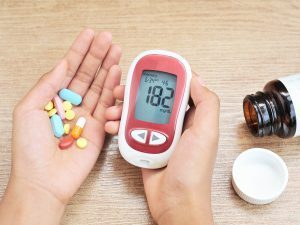- Home
- Editorial
- News
- Practice Guidelines
- Anesthesiology Guidelines
- Cancer Guidelines
- Cardiac Sciences Guidelines
- Critical Care Guidelines
- Dentistry Guidelines
- Dermatology Guidelines
- Diabetes and Endo Guidelines
- Diagnostics Guidelines
- ENT Guidelines
- Featured Practice Guidelines
- Gastroenterology Guidelines
- Geriatrics Guidelines
- Medicine Guidelines
- Nephrology Guidelines
- Neurosciences Guidelines
- Obs and Gynae Guidelines
- Ophthalmology Guidelines
- Orthopaedics Guidelines
- Paediatrics Guidelines
- Psychiatry Guidelines
- Pulmonology Guidelines
- Radiology Guidelines
- Surgery Guidelines
- Urology Guidelines
SGLT2 inhibitors reduce risk of heart attack and death: BMJ

Blood sugar lowering agents SGLT2 inhibitors lower risk of heart attack and death finds a new study.
Type 2 diabetes drug, sodium-glucose transport protein 2 (SGLT2) inhibitors are associated with a lower risk of heart attack and death as well as of major cardiovascular events, revealed a Scandinavian study published in the BMJ.
Sodium-glucose cotransporter 2 (SGLT2) inhibitors are relatively new blood-sugar-lowering drugs used in the treatment of type 2 diabetes. The most commonly used brands of SGLT2 inhibitors are canagliflozin, empagliflozin and dapagliflozin.SGLT2 inhibitors reduce blood sugar by blocking the action of a protein called sodium-glucose co-transporter-2 (SGLT2) in the kidney. This protein is responsible for reabsorbing sugar back into the body from urine.
"Our study suggests that there is cardiovascular benefit from SGLT2 inhibitors for a broader patient group in routine clinical care," says principal investigator Björn Pasternak, associate professor at Karolinska Institutet's Department of Medicine in Solna. "This is an important result that we believe may be of interest to patients as well as drug authorities and doctors."
The study was a collaboration between researchers at Karolinska Institutet in Sweden, Statens Serum Institut in Denmark, the NTNU in Norway and the Swedish National Diabetes Register. The researchers used several national registries containing data on drug use, diseases, cause of death and other data from close to 21,000 patients with type 2 diabetes who began treatment with SGLT2 inhibitors between April 2013 and December 2016.
This information was then compared with an equally sized matched population who began treatment with a different diabetes drug, a DPP4 inhibitor. The primary outcomes in the study were major cardiovascular events (defined as myocardial infarction, stroke or cardiovascular death) and hospital admission for heart failure. An important secondary outcome was any-cause death.
In the primary analysis, the patients were monitored throughout the follow-up period, regardless of whether they had completed their treatment. The researchers found that the use of SGLT2 inhibitors was associated with a reduced risk of heart failure but not with major cardiovascular events. The risk of heart failure was 34 per cent lower in the SGLT2-inhibitor group than in the DPP4-inhibitor group. The use of SGLT2 inhibitors was also linked to a 20 per cent lower risk of death.
In an additional analysis, the researchers studied the risks only when the patients took the drug and found a reduced risk of both heart failure and major cardiovascular events.
However, it is unclear whether these findings also mean that there are positive cardiovascular effects from SGLT2 inhibitors in a broader patient group. The results are applicable primarily to dapagliflozin, which was the predominant SGLT2 inhibitor used in Scandinavia during the study period.
For reference, follow the link http://dx.doi.org/10.1136/bmj.l4772

Disclaimer: This site is primarily intended for healthcare professionals. Any content/information on this website does not replace the advice of medical and/or health professionals and should not be construed as medical/diagnostic advice/endorsement or prescription. Use of this site is subject to our terms of use, privacy policy, advertisement policy. © 2020 Minerva Medical Treatment Pvt Ltd